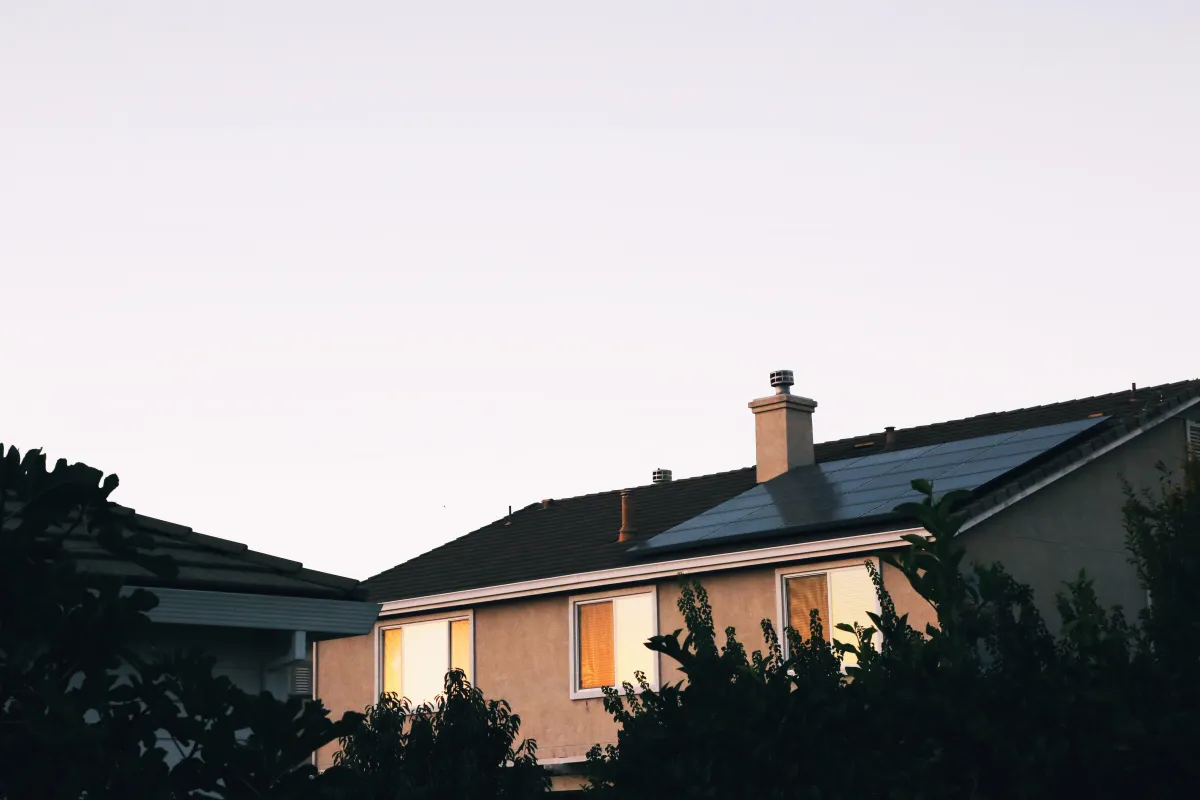LEARN ABOUT SOLAR POWER
WITH COOL SOLAR
LEARN ABOUT SOLAR POWER
WITH COOL SOLAR
Get the latest news and tips about solar power from Cool Solar. We make it easy for you to understand everything about this renewable energy source.
Get the latest news and tips about solar power from Cool Solar. We make it easy for you to understand everything about this renewable energy source.
// SOLAR COMPANY IN TEXAS
THE COOL SOLAR BLOG

How Austin Residents are Saving Money with Solar Panel Systems 🔋

How Austin Residents are Saving Money with Solar Panel Systems 🔋
Austin residents are no strangers to rising energy costs and are now looking to solar companies in Austin for a cost-effective solar installation. With the cost of electricity steadily increasing and facing possible power outages during peak times, more and more people are turning to solar power systems as an affordable, sustainable option. But how exactly can a solar energy system help Austinites save money and reduce their carbon footprint? In this blog post, we will explore the ways in which solar panel systems can help the Austin area save money, as well as introduce some of the available incentives for homeowners who opt for installing solar panels.
The Cost of Electricity in Austin ⚡️
With the cost of electricity steadily increasing in Austin, TX, residents are feeling the pinch. The Electricity Reliability Council of Texas (ERCOT) set a new record for summer electricity prices, resulting in higher electric bills for residential customers during peak times. During this period, electricity costs were as much as triple what they normally were – an unsustainable situation for any budget. With costs continuing to rise and no end in sight, solar energy is becoming an increasingly attractive energy option for Austinites looking to reduce their monthly energy bills from their utility provider. Solar technology provides a renewable source of power that can help reduce or even eliminate the high costs associated with relying on the grid, while still providing reliable access to clean energy.

Average Austin Home Energy Bill - Solar Energy Systems Worth It? 🧐
Austin, TX residents pay an average of $188 per month for electricity, with rates ranging from 7.814¢ to 9.314¢ per kWh. These costs are included in the City of Austin utility bill which may include additional charges for drainage and other services. The City of Austin's energy resource plan is designed to be flexible and dynamic, allowing for modifications as circumstances change. The Public Utility Commission of Texas monitors electricity and natural gas prices and financial flows, including research conducted by the University of Texas at Austin.

The Cost of Austin Solar Panels Systems 💵
Over the years, the cost of a solar panel installation has decreased significantly. In the past, solar panel systems were considered an expensive investment, but with the improvement of technology and the increase of demand, the cost of solar panel systems has decreased. This has made them more affordable for Austin TX homeowners, making it a more accessible investment for more households.
How Long Does It Take for Solar Panels to Pay for Themselves In ATX? 🤑
The average payback period for a solar panel system is around 6-8 years. This is the time it takes for the savings on electricity bills to offset the cost of the system. Once the payback period is over, homeowners will continue to see savings on their electricity bills, resulting in a positive return on investment. A solar panel system can last up to 25-30 years, so homeowners will see significant savings on electricity bills over the system's lifetime.

Solar Installation Services - Best Solar Companies in Austin TX 👷♀️
Solar panels generate electricity for free, but there are still costs associated with installing them. The price of solar panels can vary depending on factors such as their efficiency, capacity and location. Typically, around 25% of the total cost is for installation, with labor and additional services making up the rest. In the United States, solar panel systems typically include equipment and installation services. In 2023, solar panels in the U.S. cost an average of $20,020 for a 10 kW system, which is significantly lower than the $50,000 it costed 10 years ago. Prices can vary by state and panel brand and it is important to consider the long-term cost savings, including maintenance costs. Solar energy companies provide installation, maintenance, and financing options.
Looking for a solar panel company for your solar installation? Click here to begin.

Financial Incentives for Installing Solar Panels in Austin 😎
Residents of Austin, Texas have several financial incentives available for installing solar panels Austin area. These include a $2,500 rebate from Austin Energy, and a federal government tax credit of 26% which was available until December 31, 2022, but the solar incentives have now increased to 30% to for your own power. Plus, there are Austin solar incentives with the Austin Energy's Value of Solar Tariff which pays $0.097 for every kilowatt-hour generated and no state property tax. Additionally, some utility companies in Austin offer net metering, which allows homeowners to earn credits on their electric bills by selling excess electricity generated by their panels. Homeowners in Texas also have the protection of Texas Solar Rights Law, which safeguards the rights of homeowners to install solar panels with certain guidelines.
Savings Achieved by Austin Homeowners Who Have Installed Solar 🌞
Austin residents who have installed solar panel systems have seen significant savings on their energy bills. By generating their own electricity through solar panel systems, homeowners can reduce or even eliminate their dependence on traditional electricity sources. This can lead to substantial cost savings on their monthly energy bills. For example, one Austin homeowner installed a solar panel system and was able to reduce their electricity bills by 80%. Another Austin resident installed a solar panel system and was able to completely eliminate their utility bills. These real-life examples demonstrate the cost savings that can be achieved by enjoying solar in Austin and being one who invested in solar power. These savings can increase over time, because while the system requires some maintenance, the cost of electricity will increase as time goes by, but the solar system will generate the same amount of electricity. This means that the savings will increase as time goes by.
Additionally, homeowners can also earn additional income by selling excess electricity their solar panels produced and sending the solar power back to the grid through net metering. This can further contribute to savings on their energy bills. Yay for solar power! 🌞
Ready For Your ATX Solar Panels? Speak to our solar experts today.
New Solar Programs Coming Soon?
Austin residents who install solar panels can expect to save around $3,000 a year on their energy costs. There is also a new program in California, known as net metering, that allows homes and businesses with solar panels to pay different rates for electricity from the grid at different times of the day. An equity fund of $600 million is planned to help pay for solar panels for low-income homes, and an acre of solar panels generates 40 times more energy than an acre dedicated to growing corn for ethanol and saves between 267,526 to 303,513 pounds, or 121 to 138 metric tons, of CO2 emissions per year. In Richmond, a program called SunShares is offered, which is a limited-time group buying energy procurement program that provides discounts for residential solar and electric installations.
Best Solar Panel Company in Austin TX? Look no more...your solar company is here!

Environmental Benefits of Solar In Austin 🌱
The freedom solar provides includes numerous environmental benefits. One of the most significant benefits of solar energy is that it is a clean and renewable energy source. Unlike fossil fuels, which release harmful emissions and pollutants into the air, solar panel systems produce electricity without emitting any greenhouse gases. This makes your solar installer systems an environmentally friendly alternative to traditional energy sources. Solar panels produce energy and also help to reduce dependence on fossil fuels, which are a finite resource and are associated with negative environmental impacts such as air pollution, oil spills, and mining accidents.
Furthermore, solar installers can play a significant role in reducing carbon footprint, solar energy is one of the best ways to mitigate climate change and help to reduce the amount of carbon dioxide emissions in the atmosphere. Solar installers can also help to reduce the need for fossil fuel power plants, which can have a detrimental effect on the environment through their emissions and land use.
Finally, your solar project can also provide environmental benefits by reducing water use and conservation. Because your solar panel installation doesn't require water to generate electricity, unlike thermal power plants, it helps conserve one of our most precious resources. This can have a positive impact on water availability, particularly in regions that experience water scarcity.
Ready to speak with a solar company? We are your locally operated business ready to serve!

Want The Freedom Solar Provides? Join Solar in Austin 👫
In conclusion, solar installation costs are an excellent investment for Austin residents. The cost of electricity in Austin is higher than the national average, making the investment in solar energy even more attractive. The cost of an ATX solar install has decreased over time and the state of Texas offers several financial incentives to encourage homeowners to install solar panel systems. The savings that can be achieved by Austin solar panels who have taken the time to understand how a utility company would potentially appreciate a solar installer system is exciting, to say the least. Additionally, solar panel systems have numerous environmental benefits, they are clean, a renewable energy source that helps reduce dependence on fossil fuels, reduces carbon footprint and water consumption.
We encourage those considering a solar array to partner with the best solar companies in Austin and consider the benefits of solar panel systems and take advantage of the financial incentives available. By working with an ATX solar installer, homeowners can reduce their electricity bills and make a positive impact on the environment. If you are interested in learning more about the solar payback period and how it can benefit you, please do not hesitate to contact our company for more information or for a free energy report for your home. Our team will be more than happy to answer any questions and guide you through the process of installing a solar panel system.
(830) 832-4867
Click Here for your Free Home Efficiency Solar Report for your home!
References:
Austin Solar Incentives & Tax Credits
Solar Installer Companies in Austin TX
FAQS: RESIDENTIAL SOLAR PANEL INSTALLATIONS
How Long Do Solar Panels Typically Last?
Solar panels have a lifespan of 25-30 years on average. Proper maintenance, such as cleaning and inspections, can help prolong their lifespan. However, it's important to note that over time, the efficiency of the panels will decrease, typically at a rate of 0.8% per year, which can impact the amount of energy produced.
Is A Solar Powered Home Possible?
Yes, using solar power to run a household is entirely possible in this day and age. With the ever-evolving technologies surrounding solar panel systems, the amount of energy that can be produced by the sun is now more than enough for a home's daily power needs. This includes powering lights, air conditioning, appliances, and other essential items.
When installing solar panels on a roof or in an area with ample sunlight, homeowners can take advantage of Texas' plentiful sunshine year-round. Solar cells convert the sun's energy into electricity that can be used in your home. For optimal performance and maximum efficiency, it's important to have high-quality solar panels and batteries in order to effectively store the energy collected by these cells. A premium battery system will then allow you to store any excess energy during sunny days so you have power even during those long Texas nights.
What Should I Consider Before Installing Solar Panels?
Before making the decision to install solar panels, it is vital for you to research a few key factors and ask questions to ensure your roof is the right shape, type, orientation, direction and slope and strong enough to support your investment. You should also check up on local rebates and incentives available in your area, as well as warranties offered by the company you are considering hiring.
Additionally, be sure to look into any regulations set forth in your homeowners association (HOA) that may impact whether or not solar energy can be utilized on your property. It is also important for you to assess the current energy efficiency level of your home. Knowing how much energy you typically use on a regular basis will help determine how much solar power you need to provide the necessary amount of electricity for your family’s daily needs. You will want to factor in the cost of solar power in your area and any additional costs associated with installation when deciding which option is best suited for you financially.
In most cases, a professional installer should be consulted prior to installing new solar panels in order to make sure everything has been properly evaluated before proceeding with installation. Understanding all of these components can help ensure that you make an informed decision on whether or not solar energy is right for you.
How Many Solar Panels Do I Need?
By looking up your home's hourly energy requirement in kWh over a 30-day period, you can determine how much electricity you will need each month and therefore how many solar panels are required. This data is often available on your monthly energy statements or by simply asking your utility provider to calculate it for you.
In addition to the number of watts needed per panel (either 150W or 360W), you will also need to consider the number of peak sunlight hours in your area for the time of year when installing the system. This can vary drastically based on where you live, so an online search should provide this information quickly and easily. Once all these factors have been taken into account, then you can determine the total amount of electricity generated from a specific number of panels that best fits your needs.
It is important to note that although more wattage typically means more energy production, higher wattage doesn’t always mean savings if it’s not necessary for the size of system being installed. Furthermore, solar systems with high wattage may require larger wiring and other equipment which could increase installation costs significantly. Therefore, it is essential that homeowners do their research and understand exactly how much power they need before making any decisions regarding their system's specifications.
Additionally, it’s beneficial to seek professional advice from a qualified solar installer who can help design a customized solution tailored to meet your individual needs while still providing optimal cost savings for years to come!
Want To Automatically See How Many Panels You Need?
Begin with our Savings Calculator and we can do the work for you!
LOOKING FOR MORE?
RESERVE YOUR FREE CONSULTATION.
To get started on solar panel installation, send us your information.
We'll review your information and contact you to schedule an appointment.
An energy consultant can meet with you either in person or virtually to provide a custom proposal tailored to the size and design of your system, as well as financing and long-term savings options.
LOOKING FOR MORE?
RESERVE YOUR FREE CONSULTATION.
To get started on solar panel installation, send us your information.
We'll review your information and contact you to schedule an appointment.
An energy consultant can meet with you either in person or virtually to provide a custom proposal tailored to the size and design of your system, as well as financing and long-term savings options.


